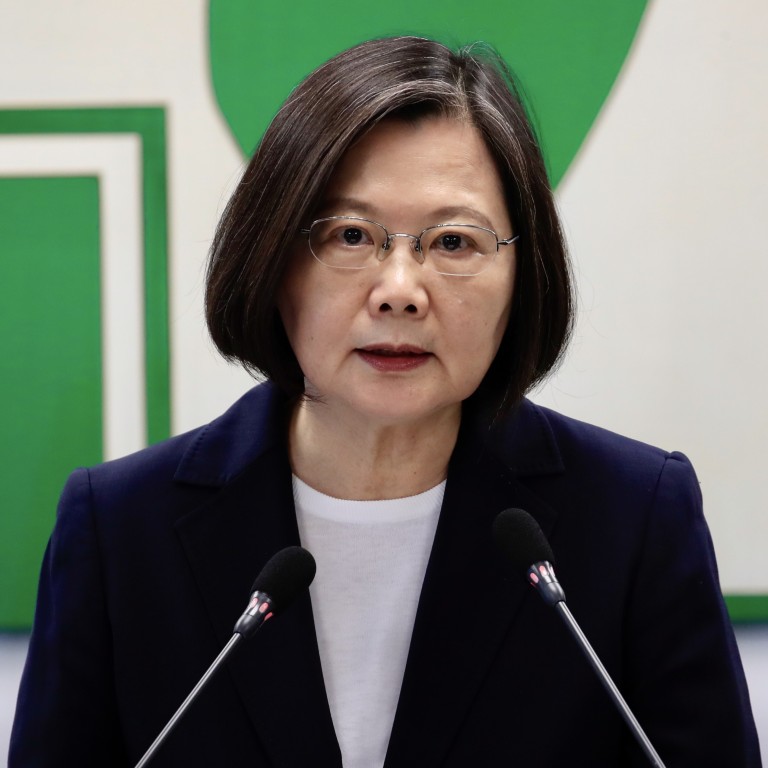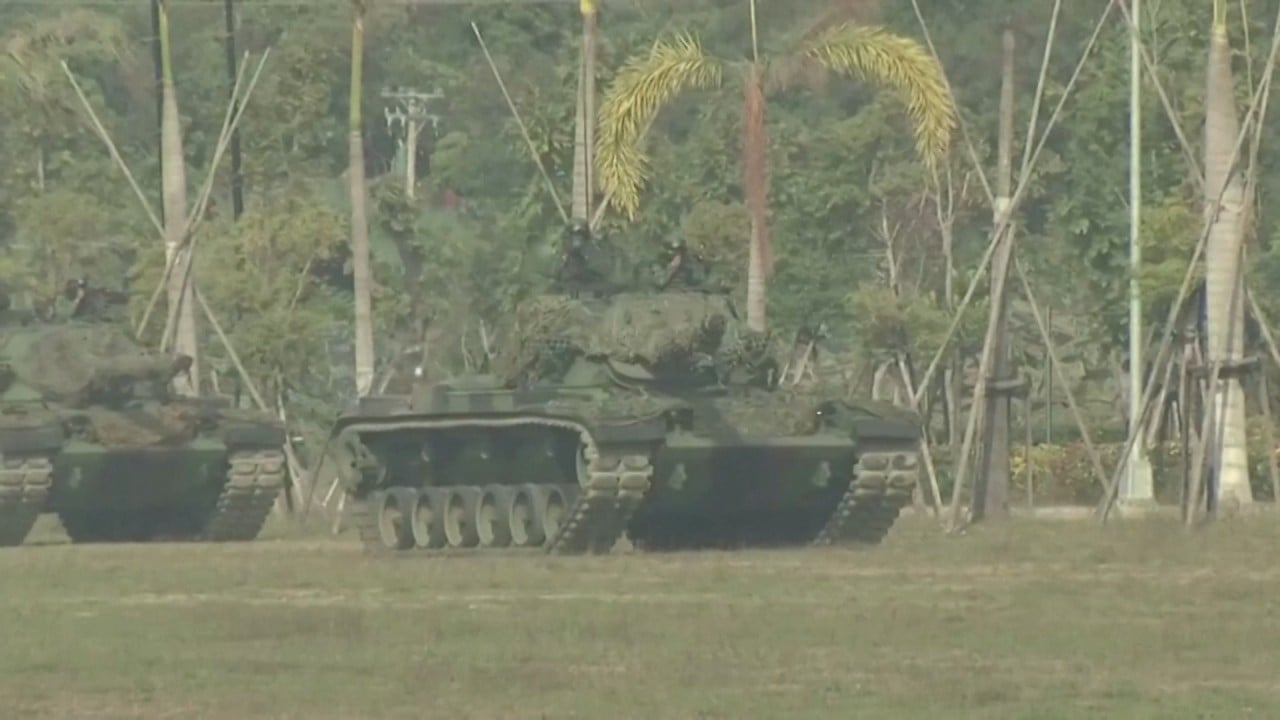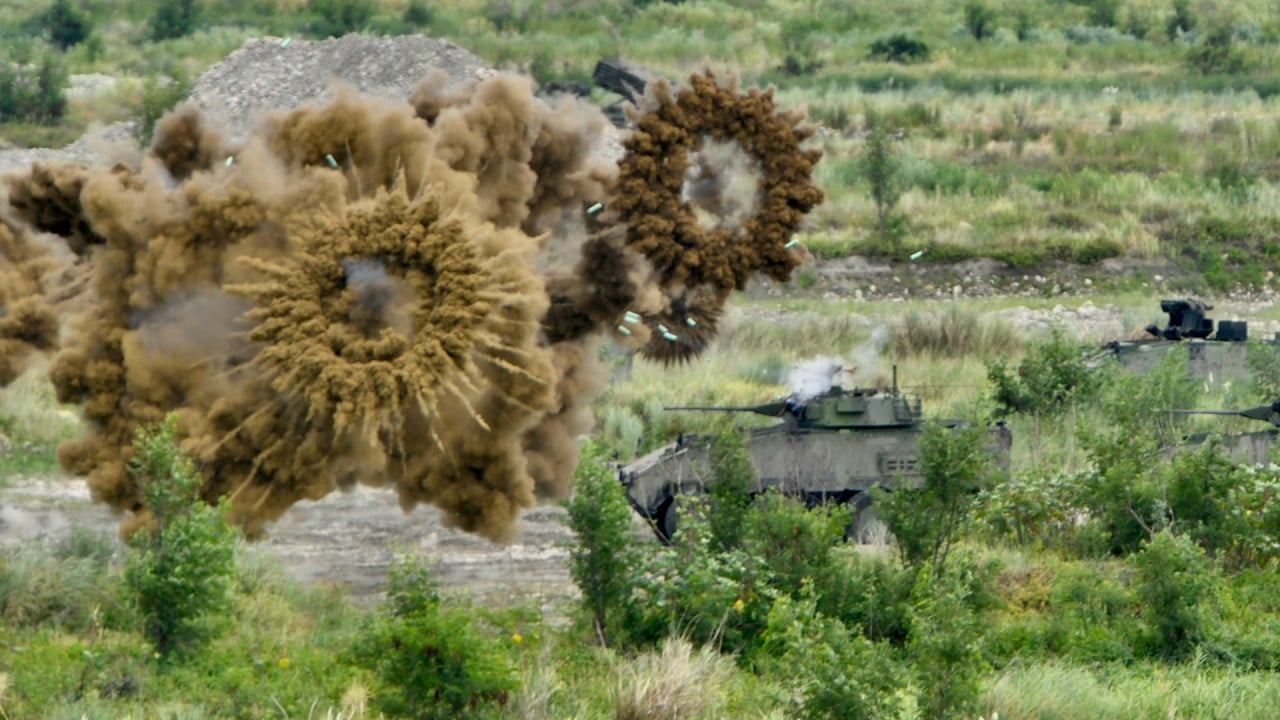
Taiwan unveils record defence budget as Beijing stands firm on claim to island
- Tsai Ing-wen says Taipei will seek a ‘constructive security relationship’ with the US and strengthen its military
- Mainland military stages drills in Taiwan Strait in ‘warning to independence supporters’

02:12
Taiwan unveils record defence budget as China stands firm on claim to island
In a virtual address to the Washington-based Hudson Institute on Wednesday, Tsai said the top priority for her second term was to strengthen the island’s military defences, including seeking a “constructive security relationship” with the US.
“Our 23 million people have the right to determine our own futures, which is [the] antithesis to the position Beijing has taken,” she said.
“Upholding these principles requires us to be able to defend Taiwan against coercive actions. It entails backing up words with actions.”

02:19
Taiwan military drill simulates coastal attack amid rising tensions with mainland China
The defence budget proposed by Tsai’s cabinet on Thursday would increase military spending to 2.4 per cent of the island’s GDP and require legislative approval.
In her speech, Tsai left the door open for Taipei and Beijing to improve cross-strait relations, acknowledging the island’s strong cultural and historical ties with mainland China.
“We will never stop believing that there can be a better future ahead where both sides can share in each other’s successes and accomplishments,” Tsai said.
South China Sea: the dispute that could start a military conflict
But she also said that “both sides should not deny each other’s existence” and that Beijing needed to accept the reality that Taiwan was a developed democracy.
Beijing has repeatedly shunned such overtures from Taipei since Tsai took power in 2016, stressing that while it sought peaceful reunification with the island, it would not give up the use of force if necessary.
“Recently, some major powers have persisted in a negative trend on the Taiwan issue, sending a serious and negative signal to those Taiwanese independence forces and seriously threatening the safety and stability of the Taiwan Strait,” Zhang said.
“The patrols and exercises by the command’s forces were a response to the security situation of the Taiwan Strait and a necessary measure to safeguard national sovereignty.”
South China Sea: Chinese military told not to fire first shot in stand-off with US forces
Hu Xijin, editor-in-chief of Global Times , a nationalistic tabloid under People’s Daily , said the exercises showed that the PLA was “fully capable” of recapturing Taiwan before the US could react.
“Today, [we] conducted drills at the north and south ends of Taiwan Strait,” Hu wrote online. “If Taiwan continues to drift further away tomorrow, then it will be war games at both ends of the Taiwan Strait and on Taiwan’s east coast.
“Then the next step will be PLA fighter jets flying over Taiwan island.”
At the Hudson event, Hsiao Bi-khim, Taiwan’s new representative to the US, also said Taiwan was working with the US to acquire military hardware, including underwater sea mines and cruise missiles for coastal defence.
Hsiao highlighted the need for Taiwan’s military to have “asymmetric capabilities” that were “cost effective, but lethal enough to become deterrence, to make any consideration of an invasion very painful”.
Yang Lixian, a research fellow at the Research Centre on Cross-Strait Relations in Beijing, said the exercises were a clear warning to the United States over its support to Taiwan, and to “Taiwanese independence” forces.
In a first, Taiwan’s missile systems track PLA fighter jets
“China doesn’t want war, but we have our bottom lines, and if they cross our bottom lines, then we have no other choice. We will be as restrained as possible, so it depends on the US.”
She said Beijing understood that the administration of US President Donald Trump was taking measures against China ahead of the US election to shift the country’s domestic focus, but that China would not easily “fall for this”.
Liu Guoshen, director of the Taiwan Research Institute at Xiamen University, said peaceful reunification remained Beijing’s preferred option but retaking Taiwan by force had always been on the table.
“Peaceful reunification and non-peaceful means are always two parallel options for Beijing,” Liu said.
Alexander Huang Chieh-cheng, a professor of international relations and strategic studies at Taipei’s Tamkang University, said the continued stalemate across the Taiwan Strait was not in the interest of either side.
Huang, a former deputy minister with Taiwan’s Mainland Affairs Council, said it was only natural that Taiwan wanted a closer relationship with the US given that Beijing had stopped official communication with Taipei.
“But if cross-strait communications continue to stall, it will lead to more twisted and abnormal relations between the US, China and Taiwan. In the long run, this does not serve the interest of either side of the Taiwan Strait,” Huang said.


